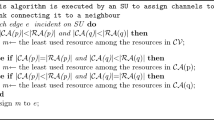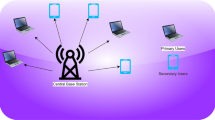Abstract
In many applications, wireless ad-hoc networks are formed by devices belonging to independent users. Therefore, a challenging problem is how to provide incentives to stimulate cooperation. In this paper, we study ad-hoc games—the routing and packet forwarding games in wireless ad-hoc networks. Unlike previous work which focuses either on routing or on forwarding, this paper investigates both routing and forwarding. We first uncover an impossibility result—there does not exist a protocol such that following the protocol to always forward others' traffic is a dominant action. Then we define a novel solution concept called cooperation-optimal protocols. We present Corsac, a cooperation-optimal protocol which consists of a routing protocol and a forwarding protocol. The routing protocol of Corsac integrates VCG with a novel cryptographic technique to address the challenge in wireless ad-hoc networks that a link’s cost (i.e., its type) is determined by two nodes together. Corsac also applies efficient cryptographic techniques to design a forwarding protocol to enforce the routing decision, such that fulfilling the routing decision is the optimal action of each node in the sense that it brings the maximum utility to the node. We evaluate our protocols using simulations. Our evaluations demonstrate that our protocols provide incentives for nodes to forward packets. Additionally, we discuss the challenging issues in designing incentive-compatible protocols in ad hoc networks.
Similar content being viewed by others
References
D. Aguayo, J. Bicket, S. Biswas, G. Judd and R. Morris, Link-level measurements from an 802.11b mesh network, in: Proceedings of ACM SIGCOMM ’04 (2004) pp. 121–132.
L. Anderegg and S. Eidenbenz, Ad hoc-VCG: a truthful and cost-efficient routing protocol for mobile ad hoc networks with selfish agents, in: Proceedings of the Ninth International Conference on Mobile Computing and Networking (Mobicom) (2003) pp. 245–259.
N. Ben Salem, L. Buttyan, J. P. Hubaux and M. Jakobsson, A charging and rewarding scheme for packet forwarding in multi-hop cellular networks, in: Proceedings of the Fourth ACM Symposium on Mobile Ad Hoc Networking and Computing (MobiHoc) (2003) pp. 13–24.
S. Buchegger and J.-Y. Le Boudec, Nodes bearing grudges: Towards routing security, fairness, and robustness in mobile ad hoc networks, in: Proceedings of the Tenth Euromicro Workshop on Parallel, Distributed and Network-based Processing (2002) pp. 403–410.
S. Buchegger and J.-Y. Le Boudec, Performance analysis of the CONFIDANT protocol: Cooperation of nodes—Fairness in dynamic ad-hoc networks, in: Proceedings of the Third ACM Symposium on Mobile Ad Hoc Networking and Computing (MobiHoc) (2002).
L. Buttyan and J. P. Hubaux, Enforcing service availability in mobile ad-hoc WANs, in: Proceedings of the First ACM Workshop on Mobile Ad Hoc Networking and Computing (MobiHoc) (2000) pp. 87–96.
L. Buttyan and J. P. Hubaux, Stimulating cooperation in self-organizing mobile ad hoc networks, ACM Journal for Mobile Networks (MONET), special issue on Mobile Ad Hoc Networks, 8 (2003) 579–592.
M. Cagalj, S. Ganeriwal, I. Aad and J. P. Hubaux, On selfish behavior in CSMA/CA networks, in: Proceedings of IEEE INFOCOM ’05 (2005) pp. 2513–2524.
Cisco Systems Inc, Data sheet for cisco aironet (2004).
E. Clarke, Multipart pricing of public goods, Public Choice 11 (1971) 17–33.
D. D. Couto, D. Aguayo, J. Bicket and R. Morris, A high-throughput path metric for multi-hop wireless routing, in: Proceedings of the Ninth International Conference on Mobile Computing and Networking (Mobicom) (2003) pp. 134–146.
S. Eidenbenz, V. S. A. Kumar and S. Zust, Equilibria in topology control games for ad hoc networks, in: Proceedings of the Joint Workshop on Foundations of Mobile Computing (2003) pp. 2–11.
J. Feigenbaum, C. Papadimitriou, R. Sami and S. Shenker, A BGP-based mechanism for lowest-cost routing, in: Proceedings of the 21st Symposium on Principles of Distributed Computing (2002) pp. 173–182.
J. Feigenbaum, C. Papadimitriou and S. Shenker, Sharing the cost of multicast transmissions, Journal of Computer and System Sciences (Special issue on Internet Algorithms) 63 (2001) 21–41.
J. Feigenbaum and S. Shenker, Distributed algorithmic mechanism design: Recent results and future directions, in: Proceedings of the Sixth International Workshop on Discrete Algorithms and Methods for Mobile Computing and Communications (2002) pp. 1–13.
J. Feigenbaum and S. Shenker, Incentives and Internet algorithms, Tutorial given at PODC 2003. Available at http://www.cs.yale.edu/jf/PODC03.ppt (July 2003).
M. Felegyhazi, L. Buttyan and J. P. Hubaux, Equilibrium analysis of packet forwarding strategies in wireless ad hoc networks—the static case, in: Proceedings of Personal Wireless Communications (PWC ‘03) (2003).
D. Ganesan, B. Krishnamachari, A. Woo, D. Culler, D. Estrin and S. Wicker, Complex behavior at scale: An experimental study of low-power wireless sensor networks, Technical Report UCLA/CSD-TR 02-0013, Computer Science Department, UCLA (July 2002).
M. Goemans, L.E. Li, V. S. Mirrokni and M. Thottan, Market sharing games applied to content distribution in ad-hoc networks (2004) pp. 55–66.
O. Goldreich, Foundations of Cryptography: Volume 1, Basic Tools, Cambridge University Press (August 2001).
T. Groves, Incentives in teams, Econometrica vol. 41 (1973) pp. 617–663.
J. Hershberger and S. Suri, Vickrey prices and shortest paths: What is an edge worth?, in: Proceedings of the 42nd Annual Symposium on Foudations of Computer Science (2001) pp. 252–259.
E. Huang, J. Crowcroft and I. Wassell, Rethinking incentives for mobile ad hoc networks, in: Proceedings of ACM SIGCOMM ’04 Workshop on Practice and Theory of Incentives and Game Theory in Networked Systems (2004) pp. 191–196.
K. Jain, J. Padhye, V. N. Padmanabhan and L. Qiu, Impact of interference on multi-hop wireless network performance, in: Proceedings of the Ninth International Conference on Mobile Computing and Networking (Mobicom) (2003) pp. 66–80.
M. Jakobsson, Ripping coins for a fair exchange, in: Advances in cryptology, EUROCRYPT ’95 (1995) pp. 220–230.
M. Jakobsson, J. P. Hubaux and L. Buttyan, A micropayment scheme encouraging collaboration in multi-hop cellular networks, in: Proceedings of Financial Crypto 2003 (2003) pp. 15–33.
M. Jakobsson, S. Wetzel and B. Yener, Stealth attacks on ad hoc wireless networks, in: Proceedings of IEEE VTC’03 (2003) pp. 2103–2111.
D.M. Kreps, Game Theory and Economic Modelling, Oxford Press (1991).
Y.-B. Lin and I. Chlamtac, Wireless and Mobile Network Architectures, John Wiley and Sons (2000).
H. Luo, R. Ramjee, P. Sinha, L. Li and S. Lu, UCAN: a unified cellular and ad-hoc network architecture, in: Proceedings of the Ninth International Conference on Mobile Computing and Networking (Mobicom) (2003) pp. 353–367.
R. Mahajan, M. Rodrig, D. Wetherall and J. Zahorjan, Experiences applying game theory to system design, in: Proceedings of ACM SIGCOMM ’04 Workshop on Practice and Theory of Incentives and Game Theory in Networked Systems (2004) pp. 183–190.
S. Marti, T. Giuli, K. Lai and M. Baker, Mitigating routing misbehavior in mobile ad hoc networks, in: Proceedings of the Sixth International Conference on Mobile Computing and Networking (Mobicom) (2000) pp. 255–265.
P. Michiardi and R. Molva, Core: A collaborative reputation mechanism to enforce node cooperation in mobile ad hoc network, in: Proceedings of Communications and Multimedia Security Conference (CMS) (2002) pp. 107–121.
N. Nisan and A. Ronen, Algorithmic mechanism design, Games and Economic Behavior 35 (2001) 166–196.
M. J. Osborne and A. Rubenstein, A Course in Game Theory, The MIT Press (1994).
C. Papadimitriou, Algorithms, games, and the Internet, in: Proceedings of the 33rd Annual Symposium on Theory of Computing (2001) pp. 749–753.
C. Perkins, Ad Hoc Networking, Addison-Wesley (2000).
I. Ray and I. Ray, Fair exchange in e-commerce, SIGecom Exchange 3 (2002) 9–17.
J. Shneidman and D. C. Parkes, Specification faithfulness in networks with rational nodes, in: Proceedings of 23rd ACM Symposium on Principles of Distributed Computing (PODC) (2004) pp. 88–97.
V. Srinivasan, P. Nuggehalli, C.-F. Chiasserini and R. Rao, Cooperation in wireless ad hoc networks, in: Proceedings of IEEE INFOCOM ’03 (2003) pp. 808–817.
D.R. Stinson, Cryptography: Theory and Practice, CRC Press (1995).
C.-K. Toh, Ad Hoc Mobile Wireless Networks: Protocols and Systems, Prentice Hall PTR, 2001.
W. Vickrey, Counterspeculation, auctions, and competitive sealed tenders, Journal of Finance 16 (1961) 8–37.
W. Wan, X.-Y. Li and Y. Wang, Truthful multicast routing in selfish wireless networks, in: Proceedings of the Tenth International Conference on Mobile Computing and Networking (Mobicom) (2004) pp. 245–259.
A. Woo and D. Culler, Taming the underlying challenges of reliable multihop routing in sensor networks, in: Proceedings of the First ACM Conference on Embedded Networked Sensor Systems (SenSys) (2003) pp. 14–27.
J. Zhao and R. Govindan, Understanding packet delivery performance in dense wireless sensor networks, in: Proceedings of the First ACM Conference on Embedded Networked Sensor Systems (SenSys) (2003) pp. 1–13.
S. Zhong, J. Chen and Y.R. Yang, Sprite, a simple, cheat-proof, credit-based system for mobile ad-hoc networks, pp. 1987–1997.
S. Zhong, L.E. Li, Y. Liu and Y. Yang, On designing incentive-compatible routing and forwarding protocols in wireless ad-hoc networks: an integrated approach using game theoretical and cryptographic techniques, in: Proceedings of The Eleventh International Conference on Mobile Computing and Networking (Mobicom) (2005) pp. 117–131.
Author information
Authors and Affiliations
Corresponding author
Additional information
Part of this paper appeared in a conference version [49]. Sheng Zhong was supported in part by NSF grants ANI-0207399 and CNS-0524030. Yang Richard Yang was supported in part by NSF grants ANI-0207399, ANI-0238038, and CNS-0435201. This work was partly done while Sheng Zhong was at Yale University; Yanbin Liu was at University of Texas at Austin.
Sheng Zhong is an assistant professor in the State University of New York at Buffalo. He received his PhD (2004) from Yale University and his ME (1999), BS (1996) from Nanjing University, China, all in computer science. His research interests include economic incentives and privacy protection, particularly incentive and privacy problems in mobile computing and data mining.
Li Erran Li received his B.E. in Automatic Control from Beijing Polytechnic University in 1993, his M.E. in Pattern Recognition from the Institute of Automation, Chinese Academy of Sciences, in 1996, and his Ph.D. in Computer Science from Cornell University in 2001 where Joseph Y. Halpern was his advisor. He is presently a member of the Networking Research Center in Bell Labs. His research interests are in networking with a focus on wireless networking and mobile computing. He has served as a program committee member for several conferences including ACM MobiCom, ACM MobiHoc, IEEE INFOCOM and IEEE ICNP. He is a guest editor for JSAC special issue on Non-Cooperative Behavior in Networking. He has published over 30 papers.
Yanbin Liu received her B.E. degree in Computer Science and Technology from Tsinghua University (1993), Beijing, China, in 1993, and her M.S. degree in Computer Science from the University of Texas at Austin (1998), where is a Ph.D. candidate. Since 2006, he has been with IBM TJ Watson Research Center, Hawthorne, NY. Her research interests are in real-time systems, grid computing, mobile computing, and computer networks.
Yang Richard Yang received his B.E. degree in Computer Science and Technology from Tsinghua University, Beijing, China, in 1993, and his M.S. and Ph.D. degrees in Computer Science from the University of Texas at Austin in 1998 and 2001, respectively. Since 2001, he has been with the Department of Computer Science, Yale University, New Haven, CT, where currently he is an Associate Professor. His current research interests are in computer networks, mobile computing, and sensor networks. He leads the Laboratory of Networked Systems (LANS) at Yale University.
Rights and permissions
About this article
Cite this article
Zhong, S., Li, L.E., Liu, Y.G. et al. On designing incentive-compatible routing and forwarding protocols in wireless ad-hoc networks. Wireless Netw 13, 799–816 (2007). https://doi.org/10.1007/s11276-006-9855-1
Published:
Issue Date:
DOI: https://doi.org/10.1007/s11276-006-9855-1




